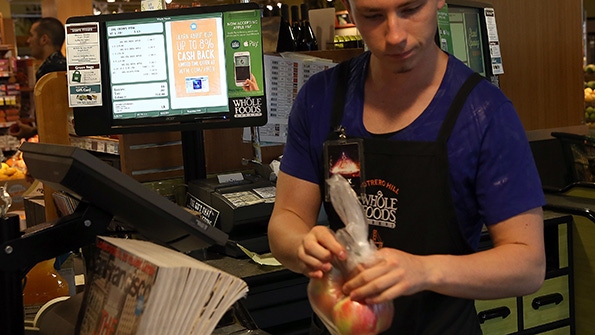Each day at 5 p.m. we collect the five top food and supplement headlines of the day, making it easy for you to catch up on today's most important natural products industry news.
April 5, 2018

Amazon hasn’t exactly blown up online grocery yet
Since it acquired Whole Foods Market last summer, Amazon has made a handful of changes to the retailer, but some analysts say industry watchers have overstated the impact of the merger on Whole Foods thus far. Analysts at Gordon Haskett Research Advisors have been keeping tabs on prices on more than 100 items at Whole Foods, to see if Amazon makes efforts to slash prices to grab market share. The verdict? Since August, the total price of those 100 items has dropped a modest 1.2 percent. Prices of some products in categories including bread and produce are actually up since then, while some snack and dairy products are down. A recent Bloomberg Intelligence study also found that, when promotions are applied, a basket of groceries at Whole Foods Market is 7 percent more expensive than at Sprouts Farmers Market. For Amazon to overhaul Whole Foods, it will need to do more than drive a shift toward e-commerce—and it seems to be taking its time in figuring out just how to do that. Read more at Bloomberg…
FDA announces mandatory recall order for kratom products containing salmonella
After investigating a multi-state salmonella outbreak, the FDA encouraged Triangle Pharmaceuticals to voluntarily recall its kratom products. The agency says six samples of its products tested positive for salmonella. But according to the agency, the company refused to cooperate, leading it to issue a mandatory recall. Separately, three companies issued voluntary recalls of their kratom products last month over salmonella concerns. This is the latest in a slew of headlines and controversies surrounding kratom, an herbal supplement that has been credited with helping people kick opioids. Read more at Natural Products Insider...
GMO yeast mimics flavors of hops, but will craft brewers bite?
Chemists and geneticists in California developed a genetically modified brewing yeast with spliced DNA from mint and basil plants that imparts hoppy aromas and flavors in beer without the use of hops. The scientists say they hope the strain will allow brewers to make beer more consistent and with fewer resources. But some brewers aren’t into the idea of using science to replace the creativity and innovation that’s at the heart of the craft beer industry. Read more at NPR…
Garden of Life exec matches career with passion for fitness, health
Sales at Garden of Life have grown from less than $60 million in 2005 to hundreds of millions today. And according to its vice president of human relations, finding the right people to help continue to grow the supplement company hasn’t been all that challenging. “Because we’re a leader in the industry, if they have that passion for health and wellness, they actually come to us,” Teresa Miller says. The most important quality she looks for in hiring? Passion and energy that show a candidate is aligned with the company’s mission to empower health. Read more at My Palm Beach Post…
Why eating insects is an American tradition
Culture—or, specifically, the “yuck” factor—is often blamed for slow adoption of eating insects in the Western world. But, it turns out, there actually is a history of bug eating in the U.S. Native communities around the country had traditions around eating insects that prevailed well into the mid-20th century. They were even considered a delicacy in some American Indian communities. Read more at Atlas Obscura…
You May Also Like


